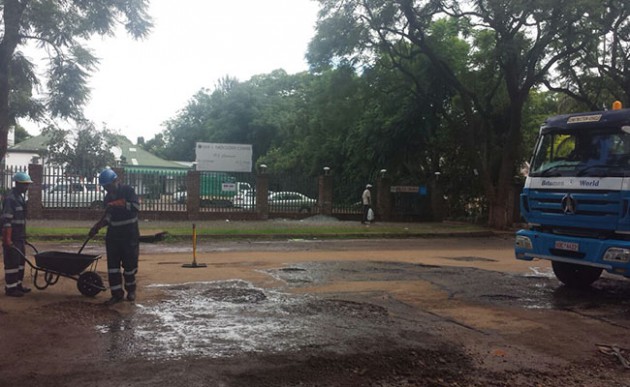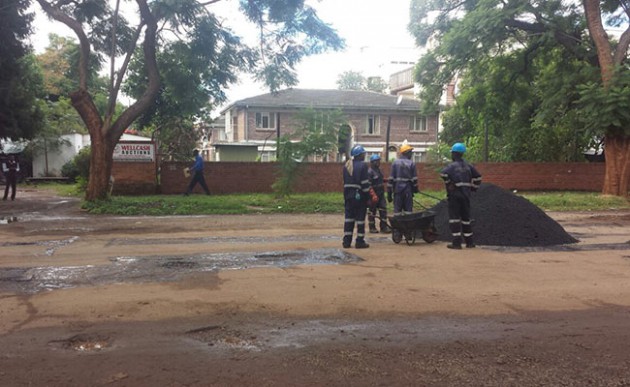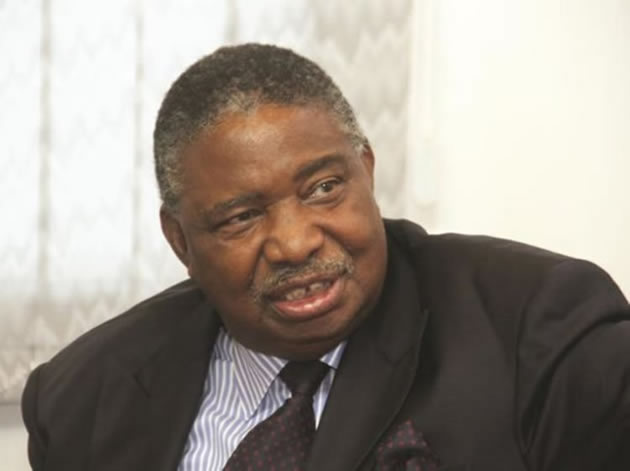Business can assist in road repairs


The rodiology centre has engaged a private company to rehabilitate the road
Sydney Kawadza Senior Features Writer
It is imperative, for some countries, to improve travel times and safety on their local roads and highways, as a way of attracting investment.
Ultimately a good road network contributes significantly to economic development.
Good roads contribute to increased interest from businesses taking advantage of the infrastructure.
This, however, is far from what is happening in Zimbabwe, especially in Harare, where driving on the roads has become a nightmare.
The rains pounding the country have made the situation dire.
Authorities cannot even catch up with the destructive force of the rains.
President Mugabe has already declared a state of disaster on Harare’s roads and road infrastructure.
The declaration was made in terms of section 27 (1) of the Civil Protection Act due to the la Nina weather phenomena, which has seen most parts of Zimbabwe receiving excessive rains. The President said a state of disaster exists on the roads and related road network infrastructure in the Harare Metropolitan Province with effect from January 26, 2017.
Government has intervened rehabilitating Seke Road, which had some stretches becoming impassable.
It has pledged to rehabilitate the part of Harare’ 5 000 km road network, as it became clear that the local authority alone could not do the job.
However, conspicuous by its absence, is the hand from the corporate world.
With council showing signs of clear strain, companies would be expected to cheap in and contribute to the rehabilitation of the roads.
Harare City Council is short of funds and operating on a shoe-string budget means they will always struggle with road maintenance.
This has motivated the MRI and Radiology Centre, which has engaged council rehabilitating the badly potholed stretch of road along Chinamano Avenue. The company has engaged a private company to resurface the block between Second Street and Mazowe Road.
According to radiologist, Dr Zahida Khanam Sirdar, the bad roads have become a major concern in the Harare.
“The potholes have become a common feature on Harare’s roads and have become very unpleasant for motorists.
“We decided to get the road repaired and we are meeting the full cost. We decided to pay for the repairs as part of a corporate social responsibility initiative.
“Our corporate philosophy is premised on the conviction that we are here to serve our patients and the community in all ways possible and to the best of our ability, to make people’s lives better, and this is one such way that we thought to serve.”
Dr Sirdar, who founded the MRI and Radiology Centre in 1996, urged other corporates to take part in community development initiatives.
“Companies should engage in activities that directly benefit those people that are in communities which they operate in.
“There are many ways in which businesses can make themselves useful and we have just but shown one way by assisting council to repair the country’s roads.”
He said the radiology centre will continue to identify areas in which they may assist communities to benefit from co-existing with their business.
Urban planning practitioner Mr Percy Toriro said assistance to council was always welcome.
“The crisis on the state of our roads means that assistance from all angles is welcome to our under-resourced city, although coordination of such efforts is important,” he said.
Mr Toriro, however, castigated uncoordinated repairs by individuals trying to earn a few dollars from motorists.
“We have witnessed a lot of uncoordinated efforts that are going on and without proper supervision some of the efforts particularly by less-knowledgeable individuals can be of little benefit.

“For an example, the boys that repair roads for ‘donations’. The benefits are minimal.”
He said corporates with better resources should either ring-fence their resources and channel them into road repair materials or ask council to guide them and they engage own road contractors.
“There is, however, lack of trust between council and stakeholders because there is a belief that resources are not being properly managed.
“Council must be more transparent so that more stakeholders can trust them and contribute towards maintaining the road network,” he said.
Harare City Council corporate communications manager Mr Michael Chideme hailed the initiative by the radiology centre.
“We welcome the participation of the corporates who should assist us as we are faced with such a daunting task,” he said.
Mr Chideme said companies can engage council in such projects as maintaining roads, building and even parks.
“We readily accept and give such organisations concessions like advertising space for free. This means there are commercial rewards for such partnerships,” he said.
The council spokesperson said most companies had engaged council in maintaining road islands.
“We would, however, readily welcome those who want to rehabilitate sections of the various roads in Harare,” he said.
Almost half of the city’s roads, Mr Chideme said, needed repair and rehabilitation.
“We have more than 5 000 kilometres of roads excluding those in new areas and we need close $800 000 for maintaining these roads,” he said.
The MRI and Radiology Centre is a leading radiology practice providing professional radiology services to patients across Zimbabwe’s health systems.
It offers general radiology (X-rays), Ultra Sound Scanning, Breast Mammography, Fluoroscopy, Ct Scanning, and MRI Scanning.

With the growing demand for advanced imaging services in Zimbabwe, the practice, in 2014, acquired a high end Siemens 1.5 Tesla MRI Scanner, setting a new standard in medical imaging.
The centre is one of the few that have this machine in Zimbabwe.
Earlier in 2010, the centre upgraded from a 4 slicer CT scanner to a 16 multi slice CT scanner.
This meant they could do faster and higher quality sophisticated 3D image processing, allowing for a more confident diagnosis on patients referred to the centre.
The MRI and Radiology Centre’s advancement in imaging technology over the years has made it possible for its team of radiologists to remain relevant experts in all radiology modalities.
◆ Feedback: [email protected]










Comments